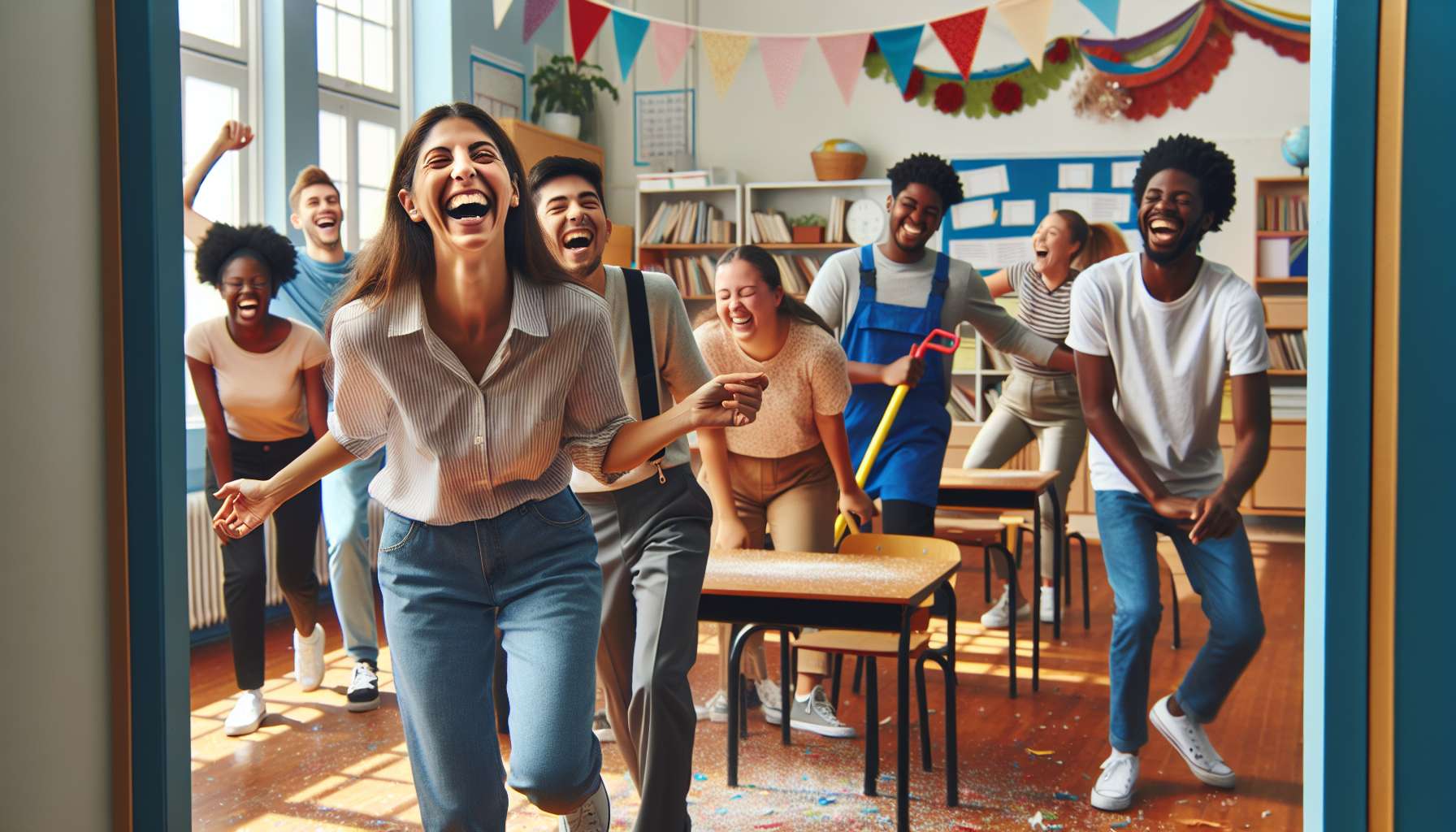
Laughter therapy finds a particularly relevant application in schools and educational environments, where it brings numerous benefits for well-being, learning, and the school climate of students. In the face of schooling challenges, such as stress, relational difficulties, or lack of motivation, laughter appears as a valuable tool to promote fulfillment, success, and living together at school.
In terms of learning, the regular practice of laughter exercises allows stimulating students’ memory, concentration, and creativity. Laughter acts as a true “brain awakening” by oxygenating the body, activating brain areas related to positive emotions, and promoting the production of neurotransmitters such as dopamine, involved in attentional and mnemonic processes. Studies have shown that students who participate in laughter breaks during classes are more attentive, memorize information better, and develop greater cognitive flexibility.
Psychologically, laughter is a formidable antidote against stress, anxiety, and emotional blockages that can hinder learning. By bringing joyful breath into a daily school routine often challenging, it allows students to release tensions, de-dramatize their difficulties, and regain self-confidence. Laughter also strengthens resilience and the ability to bounce back from failures, by cultivating a positive and combative state of mind. Regular laughter workshops can thus help prevent truancy and remotivate struggling students.
But it is especially at the relational level and in the school climate that laughter therapy makes sense in school. By sharing a moment of laughter and complicity, students learn to know each other better, to accept their diversity, and to cooperate. Collective laughter workshops are an opportunity to overcome divisions (girls-boys, good-bad students…), solve conflicts with humor, and develop empathy and social skills. For students suffering from shyness or peer rejection, laughter offers a benevolent space of expression and integration where they can feel valued.
For teachers, often faced with difficult group management and knowledge transmission, laughter therapy is a precious pedagogical and relational tool. By establishing laughter rituals in the classroom, they create a relaxed atmosphere conducive to learning, where everyone feels listened to and respected. Laughter also allows them to de-dramatize blocking situations, mobilize attention, and strengthen their bond with students. Laughter and humor training can help them develop their pedagogical creativity and prevent professional burnout.
Concretely, laughter therapy can take various forms in schools:
– Weekly laughter workshops animated by trained facilitators, during school or out-of-school time
– “Laughter breaks” of a few minutes integrated into the course of classes to invigorate learning
– Laughter spaces set up in the school (playground, common room, CDI…) with funny games and accessories
– Shows and animations around laughter and humor to unite the educational community
– Teachers’ training on the pedagogical virtues of laughter and the animation of fun activities
Among the exercises particularly adapted to the school context, we can mention:
– Standing laughter breaths that allow relaxation and refocusing between two courses
– Team laughter games that promote cohesion and cooperation in the class
– Humorous improvisations that develop self-confidence and oral expression
– Collective laughter challenges that unite the group around a joyful goal
– Positive visualizations that help to think positively and to project in success
To be fully beneficial, it is important for laughter therapy to be integrated into the school project and co-constructed with the entire educational community (students, teachers, parents, partners). It requires a safe and ritualized framework, where laughter is a tool at the service of learning and not an end in itself. Teachers have a key role to play to value the benefits of laughter, create spaces conducive to its expression, and weave links with learning.
Many pioneering schools such as the Ermesinde High School in Luxembourg, the Jeannine Manuel School in Paris, or the Sainte-Anne College in Quebec have made laughter a pillar of their pedagogical project, with very positive feedback from students, families, and teams. They testify to the need to enchant school and breathe more joy and benevolence to promote the success of all.
In conclusion, by bringing more lightness and confidence in learning, laughter therapy is a wonderful pedagogy of well-being and living together at school. An innovative and joyful approach, to make educational establishments real places of fulfillment and laughter, where we learn with a smile and in benevolence!
Key points to remember:
– Laughter therapy is particularly relevant in schools, where it brings numerous benefits for well-being, learning, and the school climate of students.
– In terms of learning, laughter stimulates students’ memory, concentration, and creativity by “awakening the brain”.
– Psychologically, laughter is an antidote against stress, anxiety, and emotional blockages that can hinder learning. It strengthens the resilience and the ability to bounce back from failures.
– At the relational level, laughter allows students to learn to know each other better, accept their diversity, and cooperate. It offers a benevolent space of expression and integration.
– For teachers, laughter is a valuable pedagogical and relational tool to create a relaxed atmosphere, de-dramatize blocking situations, and strengthen the bond with students.
– Laughter therapy can take various forms in schools: weekly workshops, laughter breaks during classes, designed laughter spaces, shows, teachers’ training.
– To be fully beneficial, laughter therapy should be integrated into the school project and co-constructed with the entire educational community.
– Many pioneering schools have made laughter a pillar of their pedagogical project, with very positive feedback.
– Laughter therapy is an innovative pedagogy of well-being and living together at school, to make it a place of fulfillment where learning is done with a smile and in benevolence.
👉 To download docx (Editable) file click here : Click here
👉 To download PDF file click here : Click here
👉 To download MP3 file click here : Click here





